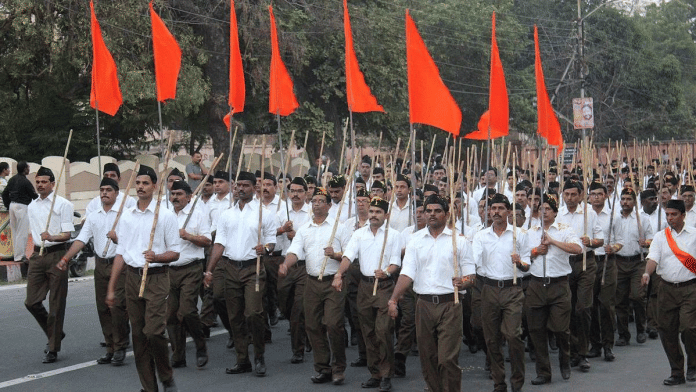New Delhi: The problem with journalists is that they do not take what we say seriously, an RSS pracharak in Haryana once told me.
“You all only see us through the lens of the BJP, and have no patience to understand the actual day-to-day work we do, and chase us only at election time,” he said. “That is why very few understand how the RSS got where it got.”
Few people still understand how the Rashtriya Swayamsevak Sangh (RSS) got here — even as the Sangh, founded on 27 September 1925 in Nagpur, celebrates its centenary year. The celebrations have come from predictable quarters. Earlier this week, Prime Minister Narendra Modi released a specially designed commemorative postage stamp and coin highlighting the Sangh’s contributions to the nation. He called the RSS the embodiment of “timeless national consciousness”.
Uttar Pradesh Chief Minister Yogi Adityanath, who does not belong to the RSS, said the “humble lamp of national awakening” lit by KB Hedgewar a hundred years ago “today shines as the eternal light.”
Even Bollywood celebrities — from Sanjay Dutt to Tamannah Bhatia — sang paeans for the organisation.
“Through every challenge, the Sangh has stayed true to the nation and nation-building,” Dutt said in a clip posted on Facebook. “Swayamsevaks have contributed in all walks of life and stood in service during every calamity,” he added, underscoring the extent of legitimacy gained by the organisation, whose mention used to be met with awkward silences by celebrities until just a few years ago.
Former Kerala DGP Jacob Thomas, a Christian, joined the organisation as a full-time pracharak on the occasion. Meanwhile, Justice KT Thomas, a former Supreme Court judge, said in Kottayam that the RSS stands for democracy, and if there was no Sangh, Indira Gandhi could have gone further ahead with the Emergency.
Even in the once-famously Left-leaning campus of the Jawaharlal Nehru University (JNU), where RSS affiliates hesitated to admit their ties publicly until a few years ago, workers paraded triumphantly.
The ubiquitous celebrations from all walks of life are telling. They reveal something about what the organisation, known for its remarkable secrecy, actually seeks. And that is why the RSS, in its 100th year, is ThePrint’s Newsmaker of the Week.
Also read: In 100 yrs of RSS, even opponents lent their voices to Hindu cause: Dattatreya Hosabale
No permanent enemies
There is a saying among RSS workers: Aparichit se parichit; parichit se dosti; mitrata se swayamsevak; swayamsevak se karyakarta; karyakarta se zimmedari.
“For the RSS, there are only two kinds of people—first, who are affiliated to the RSS, and second, who will get affiliated to the RSS. So, for us, there are no enemies,” the RSS pracharak from Haryana said.
Critics may call it an attempt at achieving complete hegemony. But it is hard to question the efficacy of the approach for an organisation that has faced three bans in the history of independent India—in the aftermath of Gandhi’s murder (1948-1949), during the Emergency (1975-1977), and following the demolition of the Babri Masjid (1992-1993).
The “no-permanent-enemies” approach also explains the RSS’ penchant for exceptional ideological flexibility from the time of its inception. Consider the following examples.
MS Golwalkar once quoted a Sanskrit saying, nripaneeti vaaraanganaiva anekaroopa, which means that politics is like a woman of questionable character, who takes on different guises to beguile. In his mental universe, politics was a permanent enemy. Yet, after the ban on the RSS following Gandhi’s murder, he gave in to the clamour within the RSS ranks to form the Jana Sangh. Decades later, the RSS gains enormously and unabashedly from the uninterrupted political power enjoyed by the BJP.
For Golwalkar, Christians and Muslims, along with Communists, were the internal enemies of Hindus. In 2018, current RSS chief Mohan Bhagwat publicly distanced the RSS from Golwalkar’s views, arguing that “every statement carries a context of time and circumstance,” and the new editions of Golwalkar’s book, The Bunch of Thoughts, do not carry the Muslim-is-an-enemy remark.
Then there is the identity issue of tribals. For decades, the RSS has fervently argued that tribals are not distinct from Hindus. But in the run-up to the Jharkhand Assembly election last year, when the demand for a separate tribal religion or Sarna code became a key poll issue, the RSS-BJP buckled, and said that the BJP would deliberate on a separate Sarna code for tribals in the decennial census, if elected to power.
Or take the example of the caste census, which the RSS said was inconsistent with the idea of a casteless society. Indeed, most critics of the RSS thought conducting a caste census would be antithetical to the ideological foundations of the RSS. Yet, last year, as the Opposition’s demand for a caste census became more voluble, the RSS came out openly in support of it, but claimed that the same should be done for the purpose of the welfare of downtrodden communities, not for electoral gains.
While critics continue to identify the RSS with its purported ideological dogmatism, it is the organisation’s ideological dynamism and flexibility that allow it to make the strides it does.
(Edited by Prashant)







Free-market capitalism is a permanent enemy of the RSS.